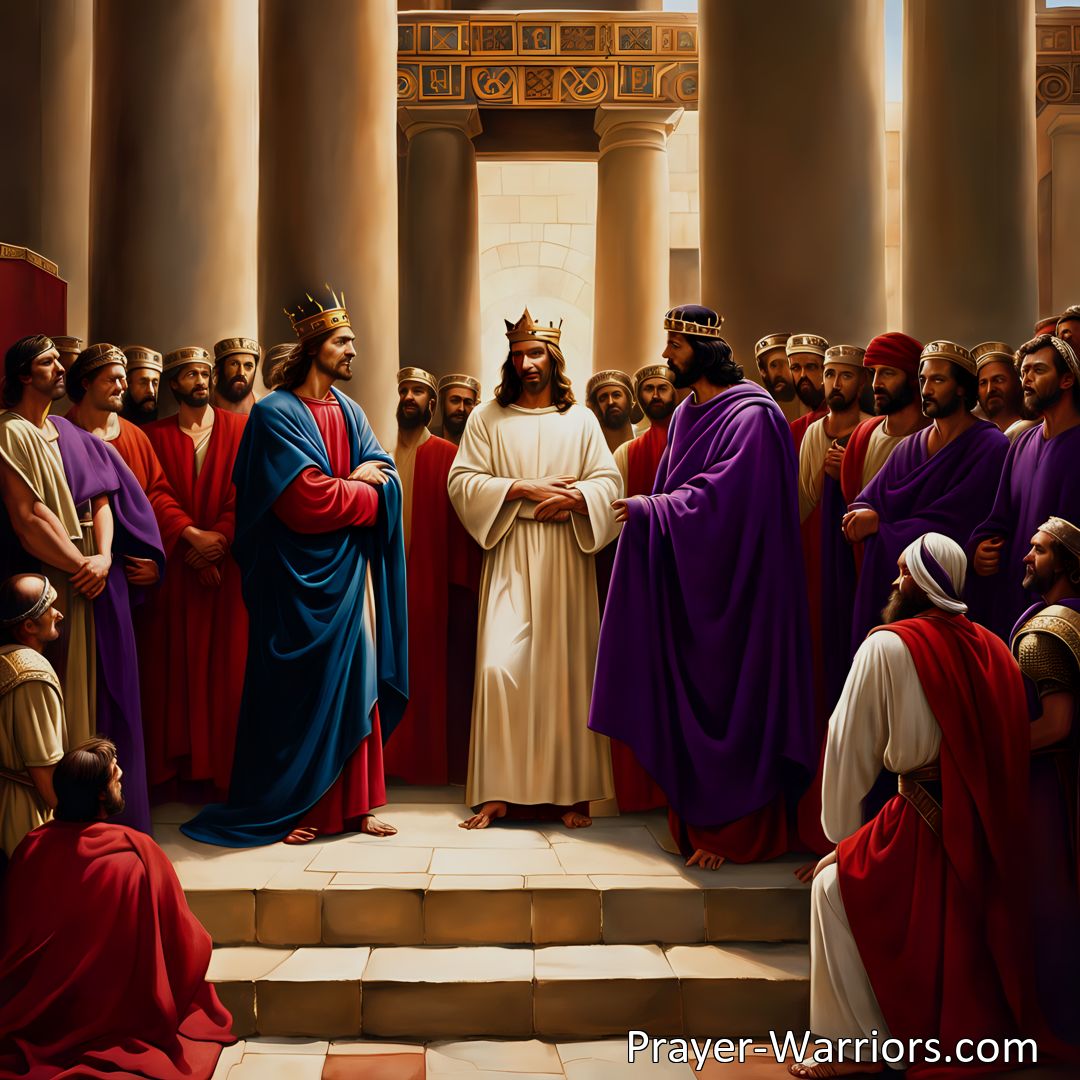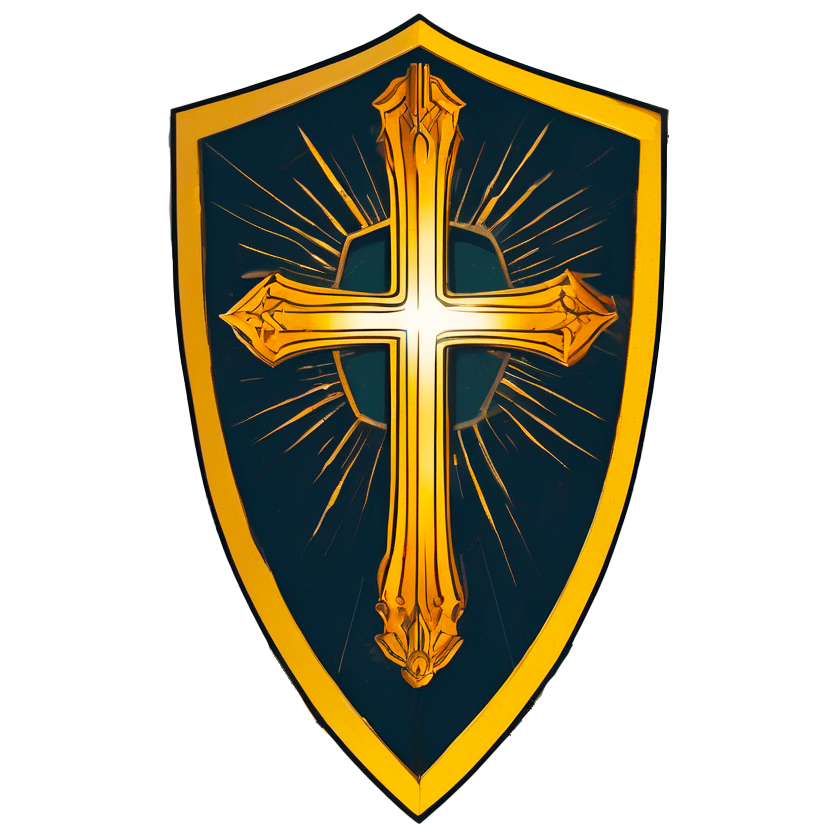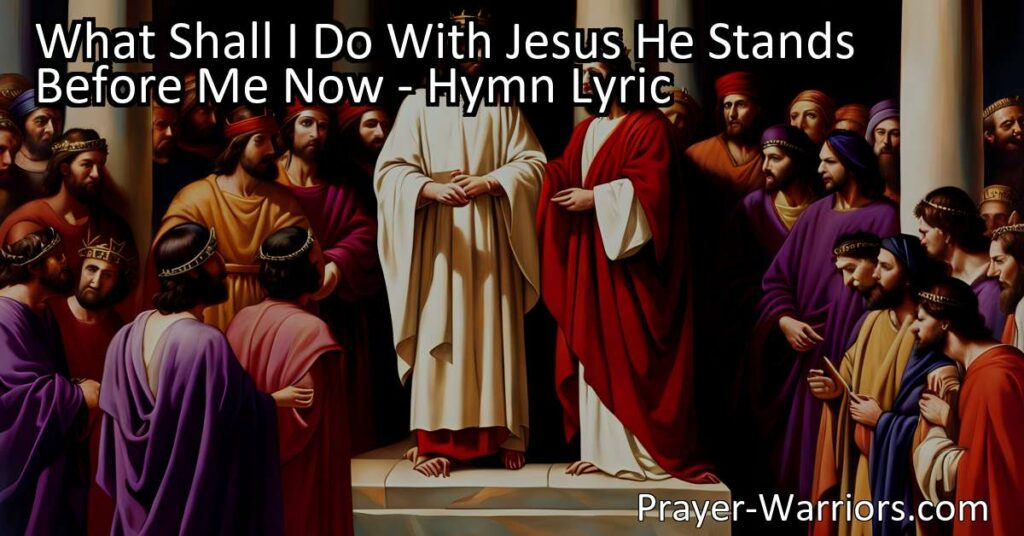What Shall I Do With Jesus He Stands Before Me Now – Hymn Lyric
In the hymn “What Shall I Do With Jesus? He Stands Before Me Now,” the author poses a powerful question that forces us to consider the choices we make when faced with Christ‘s presence. Through vivid imagery and thought-provoking verses, this hymn prompts us to reflect on the eternal significance of our decision to either embrace Jesus or crucify Him and set sin free. It encourages us, as believers, to find the courage to deny worldly temptations and choose the path of righteousness.
Table of Contents
What Shall I Do With Jesus He Stands Before Me Now – Hymn Lyric
What shall I do with Jesus?
He stands before me now,
Wearing the robe of purple,
And thorns upon His brow.
Refrain:
This is the question now;
What shall the answer be?
Shall I crucify King Jesus,
And set Barabbas free?
Shall I release the robber,
The carnal man of pride?
Sin or a sinless Saviour?–
O which shall be denied?
Refrain:
This is the question now;
What shall the answer be?
Shall I crucify King Jesus,
And set Barabbas free?
Solemn and awful question!
How still the balance stands!
Mercy a moment lingers,
It trembles in her hands.
Refrain:
This is the question now;
What shall the answer be?
Shall I crucify King Jesus,
And set Barabbas free?
Self on the seat of judgment,
Dare you the world deny?
Louder and louder calling,
“Away!” and “Crucify!”
Refrain:
This is the question now;
What shall the answer be?
Shall I crucify King Jesus,
And set Barabbas free?
Not to the sinner only,
The question comes with pow’r;
Hear it, ye halting Christians,
In ev’ry trial hour.
Refrain:
This is the question now;
What shall the answer be?
I will crucify Barabbas,
And set King Jesus free.
Meaning of What Shall I Do With Jesus He Stands Before Me Now
What Shall I Do With Jesus? He Stands Before Me Now
Introduction:
In this hymn, the author poses a powerful question that has echoed through the ages – “What shall I do with Jesus?” As we delve into the deeper meaning behind these words, we are confronted with a decision that holds eternal significance. With vivid imagery and heartfelt prose, this hymn prompts us to consider the choices we make when faced with the presence of Christ in our lives.
Verse 1:
“What shall I do with Jesus?
He stands before me now,
Wearing the robe of purple,
And thorns upon His brow.”
The hymn begins by painting a poignant picture of Jesus, standing before us in all His glory, adorned with a purple robe and a crown of thorns. This visual imagery serves as a reminder of Christ’s suffering and sacrifice for our sins. As we gaze upon Him, the question arises – what choices will we make in response to His presence?
Refrain:
“This is the question now;
What shall the answer be?
Shall I crucify King Jesus,
And set Barabbas free?”
The refrain emphasizes the weightiness of this decision. It brings to mind the biblical account where Pilate offers the choice between Jesus and Barabbas, a notorious criminal. The question resounds – will we choose to release the guilty and condemn the innocent? Shall we crucify King Jesus and grant freedom to sin and worldly desires, or will we choose the path of righteousness?
Verse 2:
“Solemn and awful question!
How still the balance stands!
Mercy a moment lingers,
It trembles in her hands.”
The hymn intensifies as it highlights the gravity of our decision. The question becomes solemn and weighty, for in our hands rests the power to choose mercy or condemnation. The delicate balance hangs in the air, and mercy itself trembles, waiting to be embraced. This verse serves as a reminder that our choices have real consequences, affecting not only our own lives but also the lives of others.
Refrain:
“This is the question now;
What shall the answer be?
Shall I crucify King Jesus,
And set Barabbas free?”
The refrain serves as a gentle nudge, repeating the question to encourage introspection and consideration. It urges us to pause and ponder the significance of our response. What shall our answer be? Will we choose to crucify the King of Kings, or will we rise above earthly desires and embrace the love and salvation offered by our Savior?
Verse 3:
“Self on the seat of judgment,
Dare you the world deny?
Louder and louder calling,
‘Away!’ and ‘Crucify!'”
In this verse, the hymn challenges us to examine our hearts honestly. It confronts our tendency to place ourselves on the seat of judgment, where we weigh our desires against the world’s expectations. It warns against the allure of conforming to societal pressures, which often shout louder and louder, drowning out the still, small voice of truth. Will we dare to go against the grain and deny the world’s demands, even when faced with its relentless cries of “Away!” and “Crucify!”?
Refrain:
“This is the question now;
What shall the answer be?
Shall I crucify King Jesus,
And set Barabbas free?”
The refrain resurfaces, gently persisting in its call for a decision. The repetition reinforces the significance of this moment and urges us to choose wisely. What shall the answer be? Shall we bow to the pressures of the world, or will we have the courage to embrace our faith and stand with Jesus?
Verse 4:
“Not to the sinner only,
The question comes with pow’r;
Hear it, ye halting Christians,
In ev’ry trial hour.”
In the final verse, the hymn broadens its scope, reminding us that this question is not limited to sinners alone; it applies to every believer. It speaks to “halting Christians,” those who may waver or struggle in their faith. It beckons them to listen attentively, for in every trial hour, this question arises. Regardless of our spiritual journey or struggles, we are all faced with choices that define our relationship with Christ.
Refrain:
“This is the question now;
What shall the answer be?
I will crucify Barabbas,
And set King Jesus free.”
As the refrain returns, it unveils the ultimate response to the question. It declares a resolved answer – “I will crucify Barabbas, and set King Jesus free.” This powerful declaration signifies a conscious decision to deny sin and embrace the freedom and salvation offered by Jesus Christ. It encapsulates the essence of the hymn, reminding us that choosing Christ over worldly desires is a transformative act that sets us on a path of righteousness.
Conclusion:
In this hymn, the question, “What shall I do with Jesus? He stands before me now,” resonates with timeless significance. As we ruminate on this question, we are reminded of the weightiness of our choices and the profound impact they have on our lives. May we find the courage to embrace our faith, deny the temptations of the world, and set King Jesus free within our hearts.
I hope this hymn inspired image brings you hope and peace. Share it with someone who needs it today!



